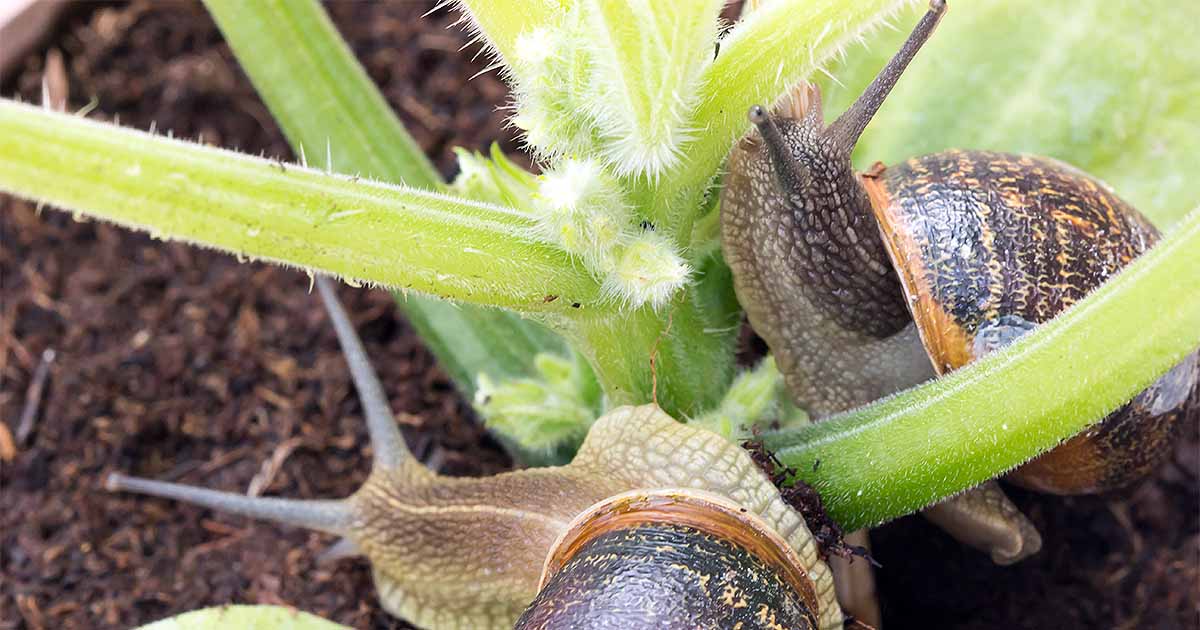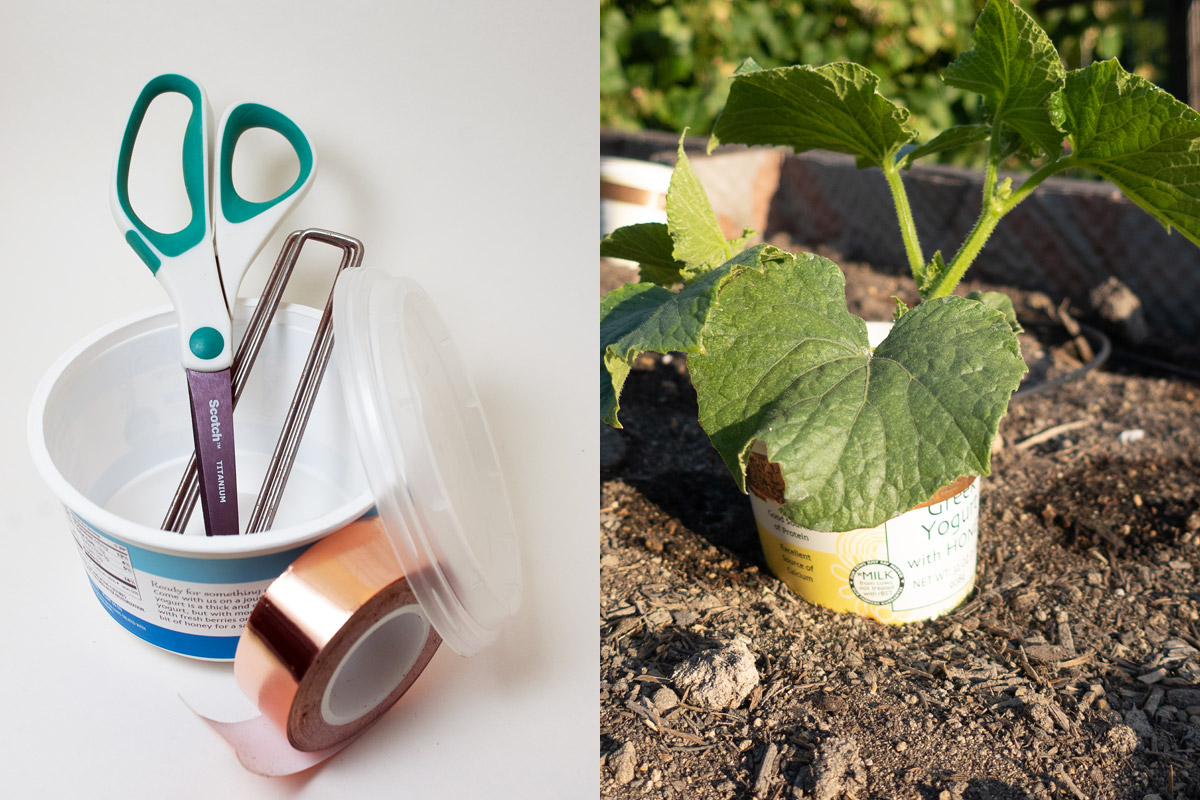Use barriers, traps, and natural predators to protect your garden from snails. Regularly check and remove any snails you find.
Snails can cause significant damage to your garden, munching on leaves, stems, and flowers. They are particularly active in damp and shady areas, making them a common problem in many gardens. To keep your plants safe, start by creating barriers like copper tape or crushed eggshells around your plants.
These materials deter snails from crossing. You can also set up beer traps, which attract and drown snails. Introducing natural predators like birds or beetles can further help control the snail population. Regularly inspecting your garden and removing snails by hand is also effective. By combining these methods, you can maintain a snail-free garden.

Credit: gardenerspath.com
Introduction To Garden Snails
Garden snails can be a real nuisance. They munch on your plants and leave slimy trails. Understanding these pests is the first step to protecting your garden. Let’s dive in and learn more about these garden invaders.
The Problem With Snails
Snails love to feast on your garden plants. They can cause significant damage. Here are some common problems:
- Chewed Leaves: Snails leave large holes in leaves.
- Damaged Fruits: Snails eat fruits like strawberries and tomatoes.
- Slime Trails: Snails leave slimy trails that can attract other pests.
These problems can ruin your garden’s appearance. They can also affect the health of your plants.
Common Snail Species
There are several types of snails you might find in your garden. Knowing them can help in controlling their population.
| Snail Species | Description |
|---|---|
| Garden Snail | Also known as the brown snail. It’s common in many gardens. |
| White-Lipped Snail | This snail has a distinctive white band on its shell. |
| Grove Snail | Known for its colorful and varied shell patterns. |
Identifying the snail species in your garden is crucial. It helps you choose the right control method.

Credit: sowrightseeds.com
Identifying Snail Damage
Snails can wreak havoc on your garden. Identifying snail damage early can save your plants. Learn how to spot signs of infestation and which plants are most at risk.
Signs Of Infestation
Snail damage can be subtle. Look for the following signs:
- Irregular Holes: Snails leave ragged, irregular holes in leaves.
- Shiny Trails: Silvery, slimy trails on soil, leaves, and stems.
- Damaged Flowers: Snails often chew on buds and blossoms.
Plants At Risk
Some plants attract snails more than others. Keep an eye on these:
| Plant Type | Examples |
|---|---|
| Vegetables | Lettuce, Spinach, Cabbage |
| Herbs | Basil, Parsley |
| Flowers | Dahlias, Petunias, Marigolds |
Protecting these plants is crucial. Monitor them regularly for signs of damage.
Natural Predators
Snails can wreak havoc on your garden. Using natural predators is an effective solution. Predators help control snail populations without chemicals. This method is eco-friendly and sustainable. Let’s explore two natural predators: birds and beneficial insects.
Encouraging Birds
Birds are excellent snail hunters. They can reduce snail numbers significantly. To attract birds to your garden, follow these tips:
- Install bird feeders and baths.
- Plant native shrubs and trees.
- Avoid using harmful pesticides.
Creating a bird-friendly environment encourages birds to visit. They will help keep your garden snail-free.
Introducing Beneficial Insects
Some insects can also help control snails. These beneficial insects include:
- Ground beetles: They prey on snails and their eggs.
- Decollate snails: They eat smaller snails and their eggs.
To attract these insects, provide suitable habitats:
- Leave some leaf litter and mulch in garden beds.
- Avoid disturbing the soil too often.
Beneficial insects work silently but effectively. They keep snail populations under control.
Barrier Methods
Snails can wreak havoc on your garden. Barrier methods are effective in keeping these pests away. These methods create physical obstacles that snails cannot cross.
Copper Tape
Copper tape is a reliable barrier against snails. When snails touch copper, a reaction occurs. This reaction creates a small electric shock. Snails avoid crossing copper tape because of this.
To use copper tape:
- Wrap it around plant pots.
- Place it around garden beds.
- Ensure there are no gaps.
Be sure to clean the tape regularly. Dirt and debris can reduce its effectiveness.
Eggshells And Gravel
Eggshells and gravel create a rough surface. Snails dislike crawling over these materials.
To use eggshells:
- Crush the eggshells into small pieces.
- Sprinkle them around plants.
- Ensure a consistent layer.
Gravel works similarly:
- Choose small, sharp gravel.
- Spread it around your garden beds.
- Maintain a thick layer.
Both materials are eco-friendly. They also improve soil drainage over time.
Organic Solutions
Organic solutions offer a natural and eco-friendly way to protect your garden from snails. These methods are safe for plants, pets, and beneficial insects. Discover simple and effective organic solutions to keep your garden snail-free.
Beer Traps
Beer traps are an easy and effective way to get rid of snails. Follow these steps to create your own beer trap:
- Take a shallow container, like a plastic cup or bowl.
- Fill it halfway with beer. Snails are attracted to the yeast.
- Dig a small hole in the soil and place the container inside. The rim should be level with the ground.
- Check the trap daily and remove any snails caught.
The beer will attract the snails, and they will drown in the liquid. This method is safe and easy to maintain.
Diatomaceous Earth
Diatomaceous earth is a natural powder made from fossilized algae. It is an excellent deterrent for snails. Here is how to use it:
- Sprinkle a thin layer around the base of your plants. This creates a barrier snails cannot cross.
- Reapply after rain or watering, as moisture reduces its effectiveness.
- Avoid inhaling the powder and wear gloves when handling it.
Diatomaceous earth works by dehydrating the snails, causing them to die. It is safe for plants and other garden creatures.
Using these organic solutions ensures your garden remains healthy and snail-free. Keep your plants safe without harming the environment.

Credit: sfbaygardening.com
Chemical Treatments
Snails can be a real nuisance in your garden. Chemical treatments can effectively control these pests. These methods are quick and can offer long-lasting protection. Below, we’ll discuss safe pesticides and proper application to keep your garden snail-free.
Safe Pesticides
Using safe pesticides is crucial to protect your garden and the environment. Look for products that are labeled safe for pets and eco-friendly. Some effective options include:
- Iron Phosphate: Safe for plants and animals.
- Metaldehyde: Effective but use with caution.
- Boric Acid: Works well but needs careful handling.
Always follow the manufacturer’s instructions. This ensures safety and effectiveness.
Proper Application
Proper application is key to keeping your garden safe. Apply the chemical treatments during the evening. This is when snails are most active.
- Wear gloves to protect your skin.
- Sprinkle or spray the treatment evenly over affected areas.
- Avoid over-application to prevent harming your plants.
- Reapply as directed, usually every few weeks.
For best results, target damp areas where snails thrive. Check for signs of snails regularly and reapply as needed.
Preventive Measures
Protecting your garden from snails is essential for healthy plants. Implementing preventive measures can significantly reduce snail damage. Below are effective techniques to keep your garden snail-free.
Watering Techniques
Snails thrive in moist environments. Adjust your watering schedule to keep soil less inviting for snails.
- Water early in the morning: This allows soil to dry by evening, making it less attractive to snails.
- Drip irrigation systems: These systems target plant roots, keeping the surrounding soil dry.
By modifying your watering techniques, you can create a less hospitable environment for snails.
Garden Cleanliness
A clean garden is less attractive to snails. Regularly remove debris and fallen leaves to reduce hiding spots.
| Task | Frequency |
|---|---|
| Remove fallen leaves | Weekly |
| Clear plant debris | Weekly |
| Trim overgrown plants | Monthly |
Maintaining garden cleanliness helps minimize snail infestation. Regularly clear debris to discourage snails from settling.
Long-term Strategies
Protecting your garden from snails requires consistent effort and planning. Long-term strategies offer sustainable solutions to keep your plants safe. These methods are effective and environmentally friendly.
Crop Rotation
Crop rotation involves changing the types of plants grown in a specific area each season. This practice disrupts the life cycle of snails. It makes it harder for them to find their favorite plants.
Use the following table as a guide:
| Year | Crop Type |
|---|---|
| Year 1 | Leafy Greens |
| Year 2 | Root Vegetables |
| Year 3 | Legumes |
Leafy greens attract snails, so rotate them with less attractive plants. Root vegetables and legumes are good alternatives.
Plant Selection
Choosing the right plants can make a big difference. Some plants naturally repel snails. Consider planting these varieties to create a snail-resistant garden.
- Lavender: Its strong scent keeps snails away.
- Rosemary: This herb is also a natural snail repellent.
- Ferns: Snails find ferns unappealing.
Create a border with these plants around your garden. This acts as a natural barrier. Snails will avoid crossing it to reach your crops.
Combining crop rotation and plant selection provides a robust defense. Your garden will be healthier and more productive. These methods are simple and effective for long-term snail control.
Frequently Asked Questions
How Do Snails Damage Garden Plants?
Snails damage plants by eating leaves, stems, and roots. They leave behind holes and slime trails. This can weaken plants and stunt their growth, making them more susceptible to diseases.
What Attracts Snails To My Garden?
Snails are attracted to moist, shaded areas with plenty of hiding spots. They also seek out gardens with decaying organic matter, like mulch and compost, as well as tender, young plants.
How Can I Naturally Repel Snails?
To naturally repel snails, use crushed eggshells or coffee grounds around plants. These create a rough surface that snails avoid. Planting herbs like rosemary and sage can also deter them.
Are There Plants That Repel Snails?
Yes, some plants repel snails. Examples include rosemary, sage, garlic, and lavender. These plants emit strong odors that snails dislike, helping to keep them away from your garden.
Conclusion
Protecting your garden from snails ensures healthy plants. Use natural remedies, barriers, and proper maintenance. Regular checks help keep snails at bay. Enjoy a thriving garden free from these pests. Happy gardening!
